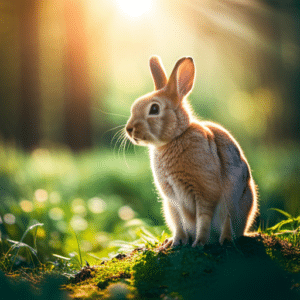Is your garden being ravaged by Peter Rabbit and his friends? You’ve spent countless hours cultivating your plants, only to find them nibbled away by these seemingly innocent creatures. Fear not, fellow gardener! This blog post will provide you with proven ways to keep rabbits out of your garden and protect your precious plants.
Key Takeaways
Identify rabbit presence in your garden through droppings, tracks, and plant damage.
Create physical barriers with fencing options and plant cages to deter rabbits from entering.
Select rabbit-resistant plants, and use companion planting techniques & natural repellents for prevention. Modify habitats by removing shelters and food sources.
Identifying Rabbit Presence in Your Garden

Before you can effectively deter rabbits from your garden, you need to confirm their presence. Eastern cottontail rabbits, the most prevalent species of wild rabbits in North America, can be identified by their substantial, tapered ears and mottled brown, black, and white fur. They nest below hedgerows and other plantings, beneath undergrowth, and inside vacated burrows.
Look for signs like droppings, tracks, and clean-cut damage to plants that indicate the presence of these small wild animals.
Droppings and Tracks

Rabbit droppings are:
Small, round, and hard balls
Typically found near plants they consume
Usually yellowy-brown or green in color
Often contain grass
These droppings can be an important clue to the presence of rabbits in your garden.
To identify rabbit tracks, look for small, round footprints with four toes on each foot, demonstrating a hopping motion. These tracks are often found in groups or in a line near garden plants. Confirming rabbit presence in your garden can be achieved by analyzing droppings and tracks, and identifying them as the ones harming your plants.
Plant Damage
Rabbits, especially young rabbits, can cause significant damage to your garden, particularly to young shoots and seedlings, which they tend to prefer. They have been known to consume:
lettuce
beans
broccoli
asparagus
basil
leeks
marigolds
pansies
The severity of rabbit damage to plants is more pronounced in winter and early spring when other food sources are scarce.
To distinguish rabbit damage from that caused by other garden pests, examine the edge of the affected area. If the edge appears to be clean-cut, it is indicative of rabbit feeding. Damage caused by other pests may appear ragged or uneven.
Physical Barriers to Deter Rabbits

One of the most effective ways to keep rabbits out of your garden is to implement physical barriers. Creating a protective barrier around your garden through fencing or plant cages can help protect your plants from rabbit intrusion.
Fencing Options
To prevent rabbits from entering your garden, consider using the following methods:
Chicken wire or mesh fencing with a mesh size of 1/2 to 1 inch.
The fence should be no shorter than two feet in height to prevent rabbits from hopping over it.
Bury the fence at least 6 inches underground to prevent rabbits from digging beneath it.
In addition to wire mesh, other types of fencing that can be used as rabbit-proof barriers include:
Vinyl Fencing
Steel fencing
Chain-link fencing
Chicken wire
PVC-coated poultry netting
Employing these options can provide an aesthetically pleasing choice. A properly constructed fence around your garden significantly diminishes the risk of plant damage by rabbits.
Plant Cages
Another effective way to protect individual plants from rabbits is to use plant cages. These cages are wire or hardware cloth enclosures that prevent rabbits from accessing the plants to nibble on them. Some suitable materials for constructing plant cages include:
Metal pinwheels
Rubber snakes
Owl statues
Tulle fabric coverings
The most suitable height for a plant cage to impede rabbit access is at least 3 feet. The use of plant cages can effectively protect your most susceptible plants from the relentless nibbling of rabbits.
Rabbit-Resistant Plants

Planting rabbit-resistant vegetation and utilizing companion planting techniques can help deter rabbits from your garden. Creating a less inviting environment for these pesky intruders can be achieved by selecting plants that rabbits find unappealing or that repel them.
Unappealing Vegetation
While no plant is entirely rabbit-proof, some plants are less attractive to rabbits than others. Examples of plants that rabbits generally dislike include:
Squash
Cucumbers
Hot peppers
Corn
Tomatoes
Potatoes
Incorporating these types of plants in your garden can help minimize rabbit presence and damage.
In addition to vegetables, certain flowers and ornamental plants are also unappealing to rabbits. Some examples of plants that rabbits tend to avoid are:
Forsythia
Lilac bush
Zinnias
Daffodils
Lavender
Snapdragons
Making your garden a less attractive target for rabbits can be accomplished by careful plant selection, including avoiding tender plants, in your garden beds.
Companion Planting
Companion planting is another effective method for deterring rabbits. This involves planting rabbit-repellent herbs and flowers, like lavender, marigolds, and snapdragons, around your garden to discourage rabbits from entering. These plants can create an uninviting environment for rabbits and protect your more vulnerable plants from their nibbling.
In addition to planting repellent herbs and flowers, you can also plant certain types of vegetation that attract the natural predators of rabbits, such as:
Foxes
Hawks
Owls
Snakes
A multi-layered defense against rabbit intrusion can be created by incorporating a variety of companion plants in your garden.
Natural Repellents for Rabbit Prevention

In addition to physical barriers and rabbit-resistant plants, you can also use natural repellents to keep rabbits at bay. Odor-based deterrents and visual or auditory scare tactics are effective methods to discourage rabbits from entering your garden and causing damage to your plants.
Odor-Based Repellents
Rabbits have a keen sense of smell, and certain odors can be highly effective in deterring them. Applying repellents like pepper spray, predator urine, or Irish Spring soap around your garden can create an unpleasant environment for rabbits, keeping them away from your plants.
Some other odor-based repellents include:
Coffee grounds
Tea bags
Citrus peels
Vinegar
Ammonia
Commercial products like Tsctba Extra-Strength Deer and Rabbit Repellent and Nature’s Mace Deer and Rabbit Repellent
These rabbit repellents possess either unpleasant odors that rabbits dislike or mimic the scent of their predators, making your garden a less attractive place for them to feed.
Visual and Auditory Deterrents
Visual and auditory deterrents are another effective way to keep rabbits away from your garden. Fake snakes, owls, or motion-activated sprinklers can be used to scare rabbits and discourage them from entering your garden. These deterrents make rabbits feel threatened, causing them to avoid the area altogether.
Auditory deterrents, such as noise-producing garden ornaments or wind chimes, can also be effective in deterring rabbits. When combined with other control methods, visual and auditory deterrents can provide a comprehensive solution to keeping rabbits out of your garden and preserving your plants.
Habitat Modification to Discourage Rabbits
Modifying the habitat around your garden can also help discourage rabbits from nesting and feeding near your plants. Making the area less appealing to rabbits and protecting your garden from their destructive habits can be achieved by removing potential shelters and reducing food sources.
Removing Shelter
Potential rabbit shelters, such as brush piles, tall grass, and low shrubs, should be removed to make the area less appealing for rabbits to nest and feed. By eliminating these shelters, you can make it more difficult for rabbits to find cover and protection, forcing them to seek refuge elsewhere.
To properly dispose of brush piles and discourage rabbit habitation, it is recommended to construct the brush pile using larger materials, such as logs or stones, at the bottom, leaving a hole or opening for animals to go in and out. Additionally, it is advised to mow tall grass regularly to prevent it from providing cover for rabbits.
Reducing Food Sources
Another way to discourage rabbits from your garden is to reduce their food sources. By planting less desirable plants and creating a separate garden for rabbits to feed on, you can minimize their presence around your main garden.
To encourage rabbits to feed in a separate garden, you can include plants like:
asparagus
basil
leeks
dandelion
white clover
pea vines
lavender
oregano
lemon balm
thyme
Protecting your primary garden from its insatiable appetite can be achieved by providing an alternative food source for rabbits, such as plants rabbits find appealing.
When to Seek Professional Assistance

While the methods discussed above can be effective in deterring rabbits from your garden, there may be times when professional assistance is necessary. If rabbit infestation becomes unmanageable or inflicts significant damage to your garden, seeking help from experts in rabbit control becomes necessary.
Assessing the Situation
To determine if professional help is necessary, assess the severity of your rabbit problem. Look for signs of severe infestation, such as:
Piles of small round brown droppings
Gnawed or stripped lower portions of plants
Grazed shoots and foliage of plants
Cleanly cut damage to leaves and stems of plants
Diagonal 45° cut damage to plants close to the ground
If you observe these signs and your efforts to deter rabbits have been unsuccessful, it may be time to seek professional assistance. A severe rabbit infestation can cause irreversible damage to your garden and may require expert intervention to resolve the issue effectively.
Pest Control Services
Hiring pest control services or consulting with experts can help you implement effective rabbit control strategies in your garden. Reputable professional pest control services for rabbit infestation include:
Trutech
Haven Pest Solutions
Dynasty Pest Control
AAAC Wildlife Removal
Critter Control
PAWS Pest Control
The estimated cost of professional pest control services for rabbit problems ranges from $189 to $565, with an average cost of approximately $300. Ensuring your rabbit problem is effectively managed and your garden is protected from further damage can be achieved by seeking professional assistance.
Summary
In conclusion, keeping rabbits out of your garden requires a multi-faceted approach that combines physical barriers, rabbit-resistant plants, natural repellents, and habitat modification. By implementing these strategies, you can effectively deter rabbits from causing damage to your precious plants and enjoy a thriving, rabbit-free garden. Don’t let Peter Rabbit and his friends ruin your hard work; take action now to protect your garden!
Frequently Asked Questions
What is the cheapest way to keep rabbits out of your garden?
The cheapest way to keep rabbits out of your garden is to use garlic, peppers, strong herbs, and a mixture of water and liquid soap. Additionally, daffodils, marigolds, and lavender should be planted around the perimeter of the garden for extra protection.
What repels rabbits from eating plants?
Rabbits can be deterred from eating plants by using commercially available deer repellents that contain a mixture of dried bovine blood, sulfured eggs, and garlic, or by applying flavor-based repellents that make plants taste bad. Additionally, rabbits tend to be repelled by plants with strong scents, such as lavender, rosemary, and thyme.
What do rabbits hate the most?
Rabbits hate strong scents, and gardeners often use ‘Taishon’ marigolds and spicy globe basil as a deterrent.
What is the best homemade rabbit repellent?
A simple mixture of water and citrus juice is the most effective homemade rabbit repellent. The citrus scent is unpleasant to rabbits, and the spray will discourage them from eating your plants.
What are some effective physical barriers to keeping rabbits out of my garden?
Chicken wire or mesh fencing and plant cages are effective physical barriers to keep rabbits out of your garden, ensuring that your garden remains rabbit-free.



